We may earn a commission if you make a purchase through the links on our website.
The Best CNAPPs
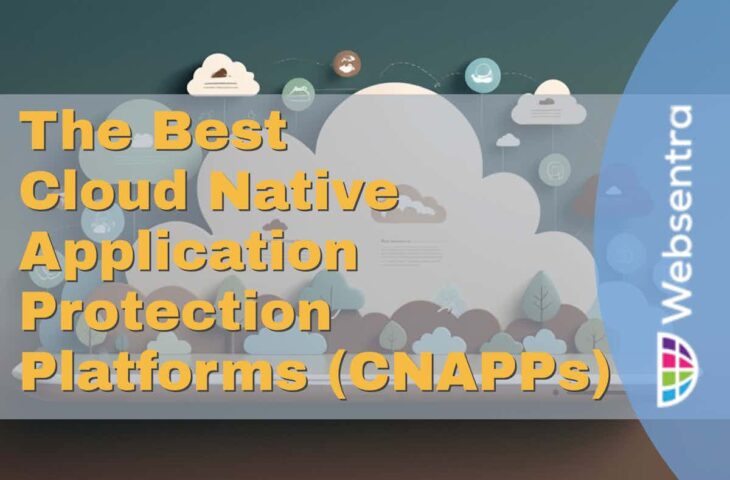
UPDATED: June 13, 2024
Dynamically protect your cloud-native applications with this selection of CNAPP solutions.
Traditional security solutions may not be adequate to defend cloud-native applications from emerging threats since they are sophisticated and dynamic. Cloud Native Application Protection Platforms (CNAPPs) can help with this. CNAPPs are built exclusively for cloud-native environments and offer a range of capabilities and functionalities to help enterprises protect their cloud apps and infrastructure. These systems enable visibility into cloud infrastructures, detect and respond to threats, and assure regulatory and best practice compliance.
Here is our list of the best Hybrid Cloud Observability Tools:
- Cyscale Provides a complete cloud security posture management solution for organizations that adopt cloud technologies. Their CNAPP solution helps secure cloud-native applications by integrating security controls and continuous security monitoring with automated remediation.
- Aqua Security End-to-end security for cloud-native applications. It focuses on container security, providing runtime protection, vulnerability management, and compliance assurance.
- Sysdig Secure CNAPP solution that provides real-time threat detection and prevention for cloud-native applications. It uses behavioral analysis and machine learning to identify and block threats before they can cause damage.
- Twistlock Focuses on container security. It provides comprehensive runtime protection for containers, including vulnerability management, compliance assurance, and threat prevention.
- StackRox Provides container and Kubernetes security. It provides real-time threat detection and prevention, compliance assurance, and runtime protection for cloud-native applications.
- Prisma Cloud Cloud security posture management, container security, and serverless security. It integrates security controls and continuous security monitoring with automated remediation to secure cloud-native applications.
Advantages of CNAPPs
One of the primary benefits of CNAPPs is that they enable full security for cloud-native systems. CNAPPs provide end-to-end security for cloud apps and infrastructure, as opposed to traditional security solutions, which may focus on certain sections of an organization's infrastructure. This assists companies in reducing their attack surface and avoiding security issues.
Another benefit of using CNAPPs is that they provide visibility into cloud settings. To identify possible threats and vulnerabilities in cloud applications and infrastructure, CNAPPs use automated scanning and monitoring. This visibility enables firms to recognize and respond to security problems in real-time, thereby reducing the effect of assaults.
CNAPP Differences
There are numerous differences to consider when it comes to CNAPP solutions. One of the most noticeable distinctions is the platform's level of automation. Some CNAPPs provide completely automated security, but others require additional personal intervention. Moreover, certain platforms are created expressly for certain cloud environments, such as Kubernetes or Amazon Web Services (AWS).
There are various aspects to consider when looking for CNAPPs. The platform's ability to detect and respond to threats is one of the most critical. Look for solutions that detect and respond to new threats using machine learning and behavioral analysis. Furthermore, the platform should offer context-aware alerts and real-time reaction capabilities to assist enterprises in responding rapidly to security problems.
Another consideration while selecting a CNAPP is the platform's compliance monitoring capabilities. To assist firms to keep on top of compliance obligations, look for solutions that provide continuous monitoring and reporting for cloud-based assets. The platform should also include automated scanning and risk assessment to identify and address vulnerabilities in cloud-based assets.
Price is another key factor to consider while selecting a CNAPP. Search for platforms that provide customizable subscription plans tailored to the demands of various enterprises. Furthermore, the platform should include a free trial or demo so that organizations can test it before committing to a paid membership.
The Best Hybrid Cloud Observability Tools
1. Cyscale
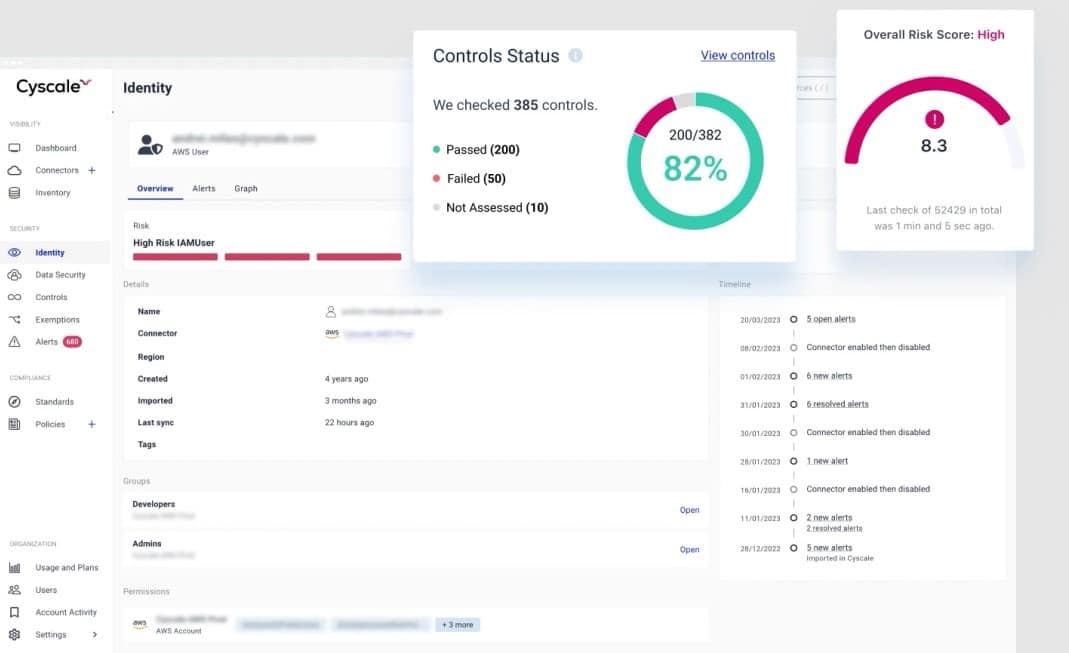
Cyscale is an all-in-one cloud security posture management solution that provides end-to-end security for cloud-native applications. To assist enterprises in securing their cloud infrastructure, it provides a CNAPP platform that integrates security controls and continuous security monitoring with automated remediation.
Key Features:
- Cloud asset inventory
- Continuous compliance monitoring
- Vulnerability management
- Runtime protection
- Integration with cloud providers
Cyscale's cloud asset inventory management is a vital tool that allows users to visualize their cloud infrastructure on a single dashboard. This functionality assists users in identifying potential vulnerabilities and provides remedial advice. Furthermore, Cyscale's continuous compliance monitoring ensures that all cloud resources adhere to industry regulations and best practices.
Cyscale's vulnerability management capabilities are another essential component. It offers real-time threat detection and prevention, as well as automated vulnerability remediation. Cyscale also provides runtime protection for cloud-native applications, utilizing behavioral analysis and machine learning to detect and prevent attacks before they cause harm.
The CNAPP platform from Cyscale is meant to work with popular cloud providers such as Amazon Web Services (AWS), Microsoft Azure, and Google Cloud Platform (GCP). Container-based deployments such as Kubernetes, Docker, and other container runtimes are also supported.
In terms of cost, Cyscale provides new users with a free trial to explore the platform before committing to a premium subscription. The premium subscription options range in price depending on the number of cloud assets and users, with prices beginning at $99 per month. There are no hidden costs or additional fees in the pricing model.
Despite its numerous advantages, Cyscale may have some drawbacks. One potential concern is that the advanced features of the platform may necessitate a greater level of technical ability to properly employ. Furthermore, the price structure of the platform may be too expensive for smaller enterprises or those with limited cloud assets.
Ultimately, Cyscale is an all-in-one cloud security posture management solution that enables end-to-end security for cloud-native applications. Its features, such as cloud asset inventory management, continuous compliance monitoring, and vulnerability management, make it a strong cloud infrastructure security solution. While its complex features may necessitate more technical knowledge, its straightforward pricing plan and connectivity with leading cloud providers make it an appealing alternative for enterprises wishing to secure their cloud assets.
2. Aqua Security
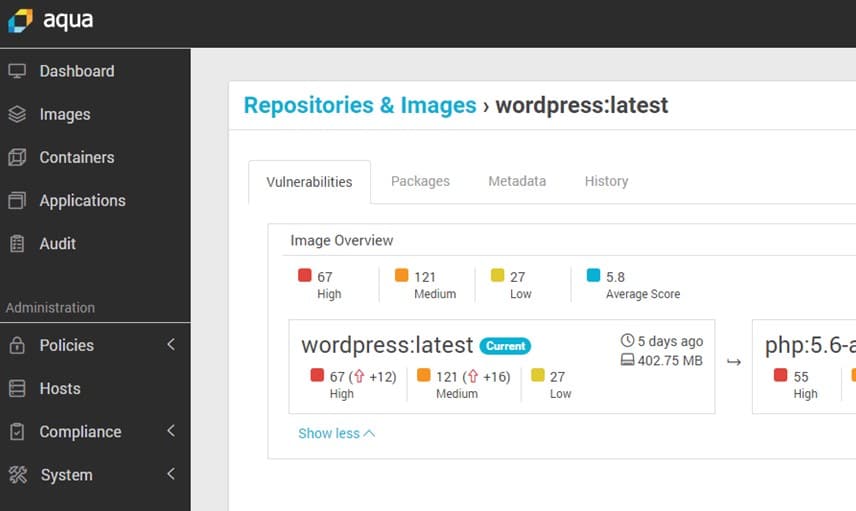
Aqua Security is a comprehensive CNAPP platform designed to secure cloud-native applications from start to finish. It has several features and functionalities that aid in the security of containerized apps and cloud infrastructure.
Key Features:
- Container security
- Image scanning
- Compliance monitoring
- Governance policies
- Machine learning-based detection
Aqua Security's container security capabilities are a major component. It offers container runtime protection, including vulnerability management, compliance assurance, and threat avoidance. Aqua Security uses machine learning to detect and block threats in real-time, allowing enterprises to remain safe from known and new dangers. Aqua Security also provides image scanning capabilities, allowing customers to scan container images for vulnerabilities before deploying them. This feature assists in identifying potential vulnerabilities and providing remedial recommendations, ensuring that containerized applications are secure from the start.
Aqua Security's compliance and governance skills are also crucial. Continuous compliance monitoring is provided by the platform to guarantee that cloud resources comply with industry rules and best practices. It also provides governance policies to assist enterprises in enforcing security policies throughout their whole cloud infrastructure.
Aqua Security offers a variety of subscription programs tailored to satisfy the demands of various enterprises. The pricing is based on the number of hosts or containers that need to be secured, with prices starting at $4,000 per host per year. Aqua Security also provides new users with a free trial, allowing them to explore the platform before committing to a paid subscription.
While Aqua Security has numerous advantages, it may have some disadvantages. One potential issue is that the platform's pricing may be too expensive for smaller businesses or those with limited cloud resources. Also, some users may find the platform's user interface confusing and difficult to use.
3. Sysdig Secure
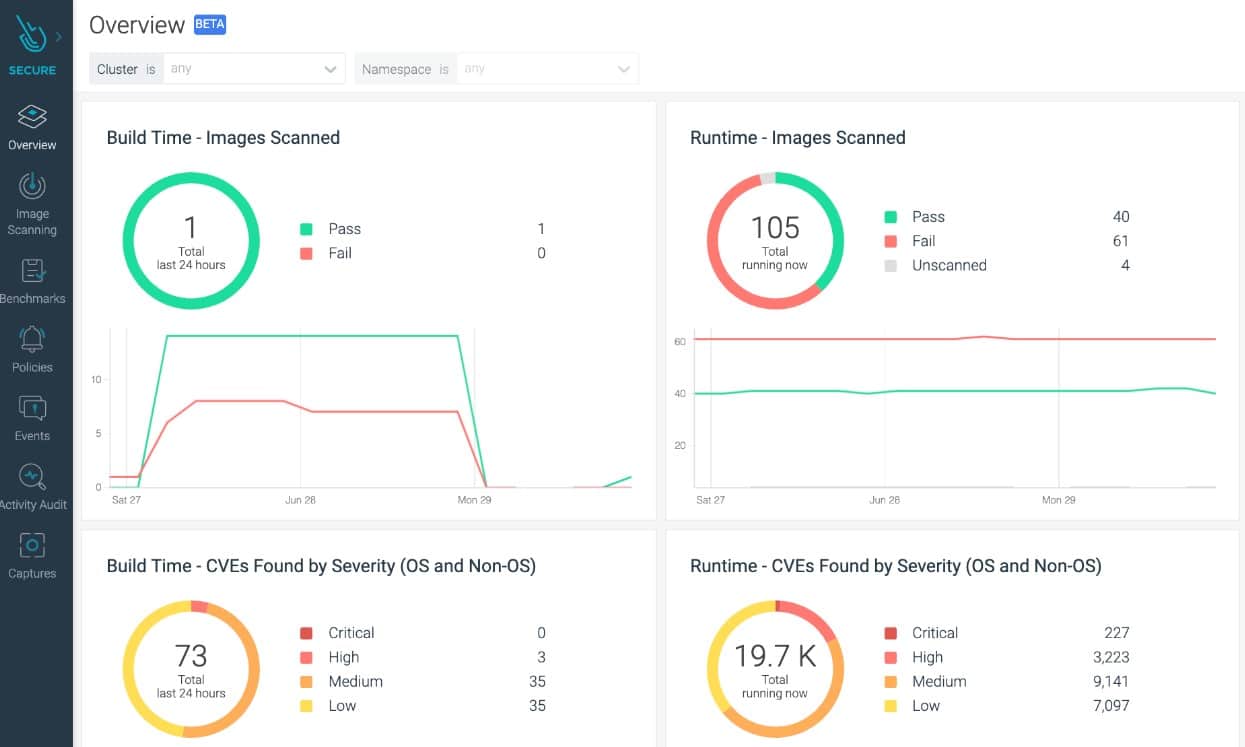
Sysdig Secure is a cloud-native security technology that offers comprehensive protection for Kubernetes and container environments. It includes several features and services that assist companies in detecting, preventing, and remediating threats in real-time.
Key Features:
- Runtime security
- Vulnerability management
- Compliance monitoring
- Built-in policies
Sysdig Secure's runtime security capabilities are a crucial aspect. The platform detects and prevents risks in real time using behavioral analysis and machine learning, guaranteeing that Kubernetes and container environments are safe from known and unexpected threats. Sysdig Secure also has vulnerability management capabilities, allowing customers to scan container images for vulnerabilities before deployment. This functionality assists enterprises in ensuring the security of their containerized applications from the start.
Compliance monitoring capabilities are another significant component of Sysdig Secure. Continuous compliance monitoring is provided by the platform to guarantee that Kubernetes and container environments comply with industry rules and best practices. It also includes strategies that assist enterprises in enforcing security regulations across their whole infrastructure.
In terms of pricing, Sysdig Secure provides a variety of subscription plans tailored to the demands of various enterprises. Pricing is determined by the number of hosts or containers that must be protected, with fees beginning at $2,000 per host per year. Sysdig Secure also provides new users with a free trial, allowing them to try the platform before committing to a premium membership.
While Sysdig Secure has numerous advantages, it may have certain disadvantages. One potential concern is that the advanced features of the platform may necessitate a greater level of technical ability to properly employ. Also, some users may find the platform's user interface confusing and difficult to use.
4. Prisma Cloud Compute Edition (formerly Twistlock)
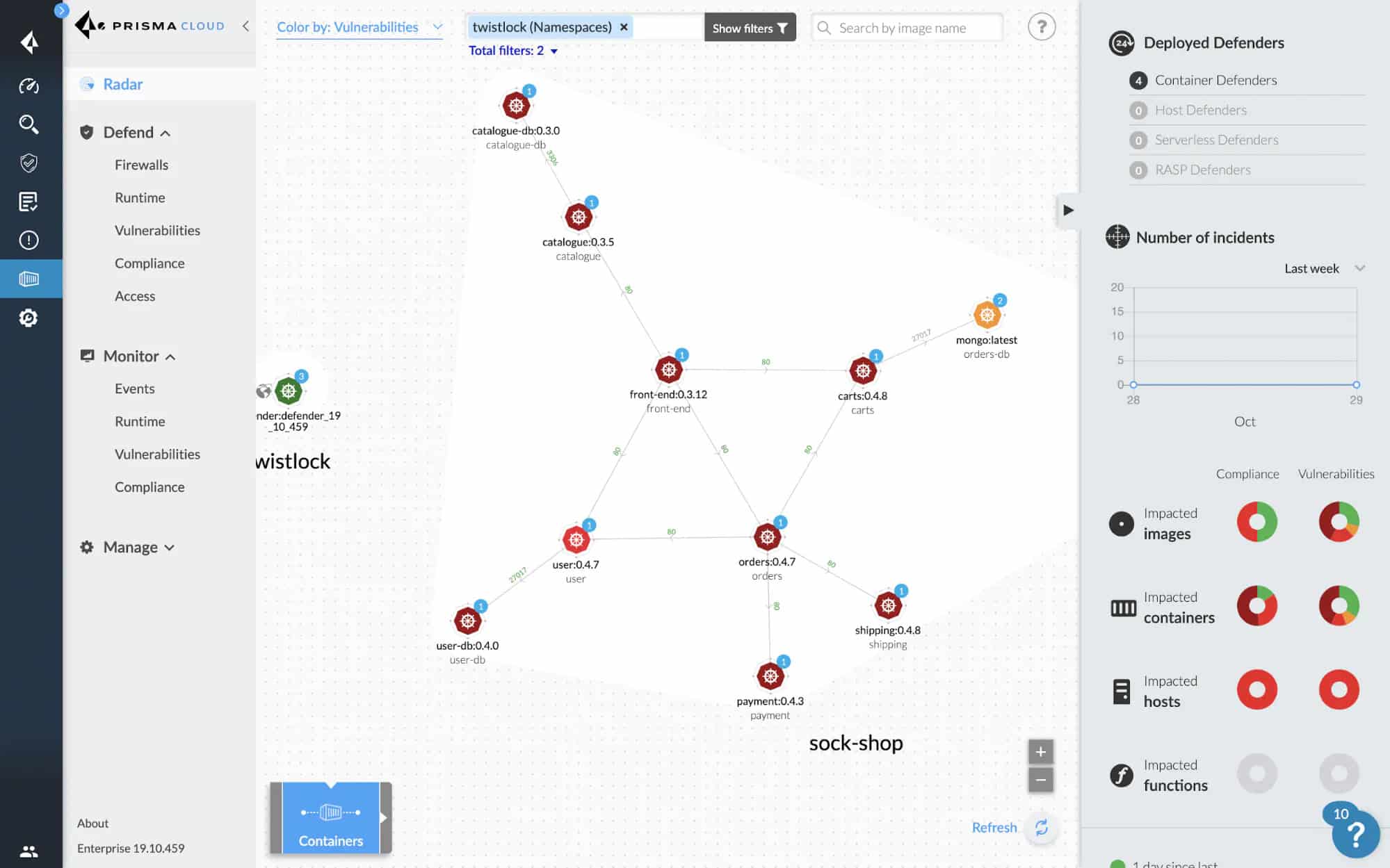
Prisma Cloud Compute Edition (formerly Twistlock) is a comprehensive cloud-native security platform that aims to protect containerized applications and cloud infrastructure. Prisma Cloud Compute Edition's vulnerability management capabilities are a major feature. The technology uses machine learning to scan container images for vulnerabilities and make remedial recommendations. This assists enterprises in identifying potential vulnerabilities and ensuring the security of their containerized applications from the start.
Key Features:
- Vulnerability management
- Runtime protection
- Compliance monitoring
- Governance policies
Prisma Cloud Compute Edition also provides containerized apps with runtime protection. The platform employs behavioral analysis to detect and prevent risks in real-time, assisting organizations in remaining safe from known and unexpected dangers.
Prisma Cloud Compute Edition's compliance and governance capabilities are also crucial. Continuous compliance monitoring is provided by the platform to guarantee that cloud resources comply with industry rules and best practices. It also provides governance policies to assist enterprises in enforcing security policies throughout their whole cloud infrastructure.
While Prisma Cloud Compute Edition has numerous advantages, it may have some disadvantages. One potential issue is that the platform's pricing may be too expensive for smaller businesses or those with limited cloud resources. Also, some users may find the platform's user interface confusing and difficult to use.
Prisma Cloud Compute Edition offers a variety of subscription programs tailored to fit various organizational needs. Pricing is determined by the number of hosts or containers, with fees starting at $2,000 per host per year. It also offers a free trial for new customers, allowing them to explore the platform before committing to a paid subscription.
5. StackRox
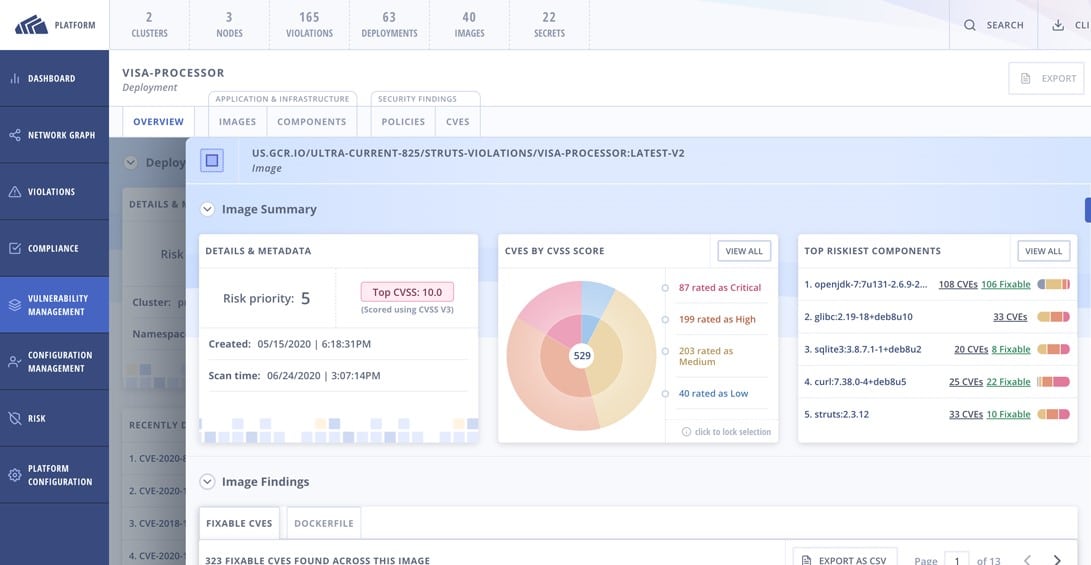
StackRox is a cloud-native security platform that provides a variety of features and functionalities to assist enterprises in protecting their containerized apps and cloud infrastructure. Machine learning and other advanced technologies are used in the platform to deliver real-time threat detection, vulnerability management, compliance monitoring, and other security features.
Key Features:
- Threat detection
- Vulnerability management
- Compliance monitoring
- Context-aware alerts
- Policy enforcement
StackRox's threat detection capabilities are one of its most important aspects. The platform employs behavioral analysis and machine learning to detect and remediate vulnerabilities in real-time, allowing businesses to stay ahead of evolving security risks. It also delivers context-aware warnings and automated incident response tools to assist enterprises in responding swiftly and effectively to security events. While StackRox has numerous advantages, it may have certain disadvantages. One potential issue is that the platform's pricing may be too expensive for smaller businesses or those with limited cloud resources. Also, some users may find the platform's user interface confusing and difficult to use.
In addition, StackRox provides complete vulnerability management features. To assist enterprises in identifying and addressing vulnerabilities in their containerized apps and cloud infrastructure, the platform employs a combination of vulnerability scanning, risk profiling, and remediation guidance. This assists companies in lowering their attack surface and avoiding security issues.
Another essential feature of StackRox is its compliance monitoring capabilities. The platform offers continuous compliance monitoring and reporting to assist enterprises in ensuring that their cloud infrastructure adheres to industry rules and best practices. It also offers policy enforcement features to assist enterprises to enforce security standards throughout their whole cloud architecture.
StackRox provides a variety of subscription plans tailored to the demands of various organizations. Pricing is determined by the number of hosts or containers that must be protected, with fees beginning at $2,000 per host per year. StackRox also provides a free trial period for new customers to explore the platform before committing to a premium subscription.
6. Prisma Cloud
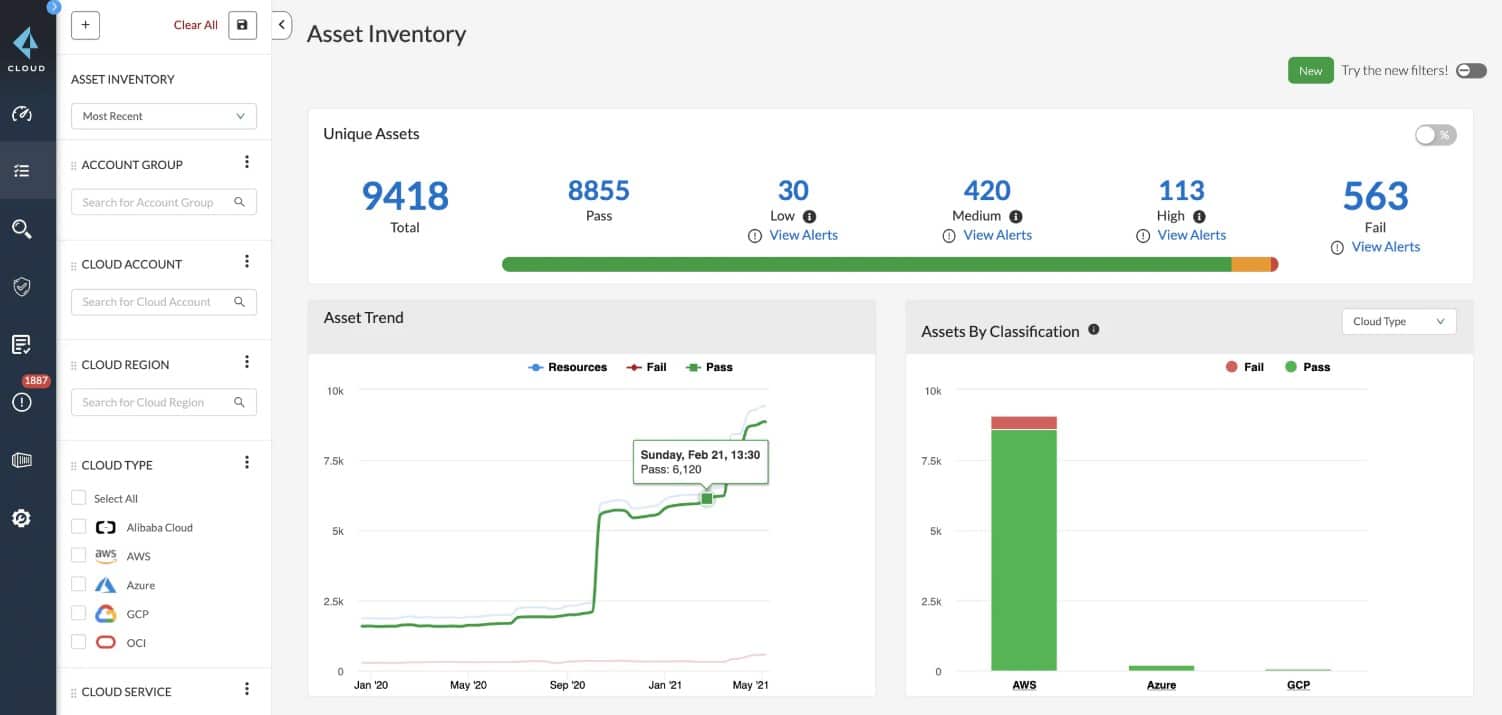
Prisma Cloud is a cloud-native security platform that offers a variety of features and services to assist businesses in protecting their cloud infrastructure and apps. To provide comprehensive security for cloud-based assets, the platform includes vulnerability management, runtime protection, and compliance monitoring features, among others.
Key Features:
- Vulnerability management
- Runtime protection
- Compliance monitoring
- Behavioral analysis
- Continuous monitoring
Prisma Cloud's vulnerability management capabilities are one of its most notable features. To discover and address vulnerabilities in cloud-based assets such as containers and serverless functions, the platform employs automated scanning and risk assessment. This assists companies in reducing their attack surface and avoiding security issues.
Prisma Cloud's runtime protection features are another significant element. The platform detects and responds to threats in real time using behavioral analysis and machine learning, allowing enterprises to remain ahead of developing security risks. It also gives enterprises visibility into network traffic and activity, which helps them detect and avoid threats.
Prisma Cloud also provides compliance monitoring to assist enterprises in ensuring that their cloud infrastructure is by industry rules and best practices. To help enterprises remain on top of compliance needs, the platform delivers continuous monitoring and reporting for cloud-based assets such as containers, serverless operations, and cloud services.
While Prisma Cloud has numerous advantages, it may have certain disadvantages. One potential issue is that the platform's pricing may be too expensive for smaller businesses or those with limited cloud resources. Also, some users may find the platform's user interface confusing and difficult to use.
Prisma Cloud offers a variety of subscription programs tailored to satisfy the demands of various enterprises. The pricing is determined by the number of cloud assets that must be secured, with prices beginning at $9,000 per year for up to 100 cloud assets. Prisma Cloud also provides new customers with a free trial, allowing them to explore the platform before committing to a premium subscription.